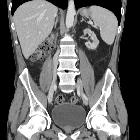Zinner-Syndrom
























Zinner syndrome is a triad of mesonephric (Wolffian) duct anomalies comprising unilateral renal agenesis, ipsilateral seminal vesicle cyst, and ejaculatory duct obstruction .
Clinical presentation
Patients are typically diagnosed during the 3 or 4 decade of life and often present with perineal pain, recurrent prostatitis, hematospermia, painful ejaculation, and infertility.
Pathology
There is an association between congenital malformations of the seminal vesicle and the ipsilateral upper urinary tract because both the ureteral buds and the seminal vesicles originate from the mesonephric (Wolffian) duct .
Maldevelopment of the distal part of the mesonephric duct results in atresia of the ejaculatory duct (leading to obstruction and dilatation of the seminal vesicle), while an abnormality in the ureteral bud leads to renal agenesis/dysplasia .
Radiographic features
Irrespective of imaging modality, the key findings are:
- unilateral renal agenesis
- ipsilateral ejaculatory duct obstruction
- ipsilateral seminal vesicle cyst
Small testis and ipsilateral ureterocele have also been reported .
Treatment and prognosis
In asymptomatic patients, treatment is usually conservative, however, symptomatic patients are often treated surgically .
History and etymology
Zinner syndrome was first described by A Zinner in 1914 .
Differential diagnosis
Seminal vesicle cysts should be differentiated from other cysts such as :
See also
Siehe auch:
- einseitige Nierenagenesie
- Zyste des Utriculus prostaticus
- dilatierte Samenbläschen mit multiplen Zysten
- Samenblasenzyste
und weiter:

 Assoziationen und Differentialdiagnosen zu Zinner-Syndrom:
Assoziationen und Differentialdiagnosen zu Zinner-Syndrom:

